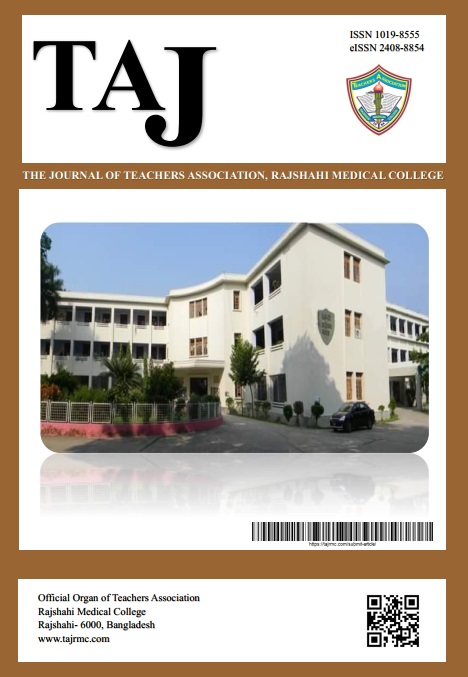| Effect of Intravitreal Injection of Bevacizumab with Laser Photocoagulation versus Combination of Intravitreal Injection of Bevacizumab with Triamcinolone Acetonide in the Treatment of Diabetic Macular Edema |
| Sujit Kumar Sarker, Dipak Kumar Nag, Md. Yousuf Ali, Naimul Haque, ShammeeTasmia |
| DOI: |
| Pdf Download |
Background & Objective: Recently there are various treatment modalities for the patients of diabetic macular edema. So, it is very difficult to choose the option. This study was aimed to compare the efficacy of combination of intravitreal injection of bevacizumab with laser photocoagulation versus combination of intravitreal injection of bevacizumab with triamcinolone acetonide in the treatment of DME. Methods & Materials: A prospective observational study was conducted on 50 eyes of fifty patients who were diagnosed with DME at vitreo-retina department of NIO&H. They were divided into 2 groups, Group A (treated with bevacizumab with laser photocoagulation) and Group B (treated with intra-vitreal bevacizumab with triamcinolone acetonide). Follow-up pattern was set after 1 and 3 months of intervention. All the baseline data and outcome data were recorded in a pre-designed data collection sheet and was statistically analyzed by SPSS version 23. Result: Mean baseline BCVA was 0.57±0.29 (SD) Log MAR in group A and 0.70±0.26 (SD) Log MAR in group B (p=0.57). BCVA was 0.40±0.32 (SD) and 0.40±0.37 (SD) in group A and 0.58±0.28 (SD) and 0.45±0.36 (SD) in group B during 1st and 2nd follow-up respectively. Comparison of mean BCVA between two groups at final follow-up was not significant. Improvement of CMT from baseline in every follow up in each group was significant but comparison of mean CMT between two groups at final follow-up was not significant (p=0.64). Though the difference of baseline IOP of both groups are statistically significant, comparison of mean IOP between two groups at final follow-up was not significant (p=0.67). Conclusion: There was significant improvement in mean BCVA and mean CMT within the group in each follow-up. At final follow-up, Combination of intravitreal bevacizumab and triamcinolone acetonide shows better improvement which is non-significant.

